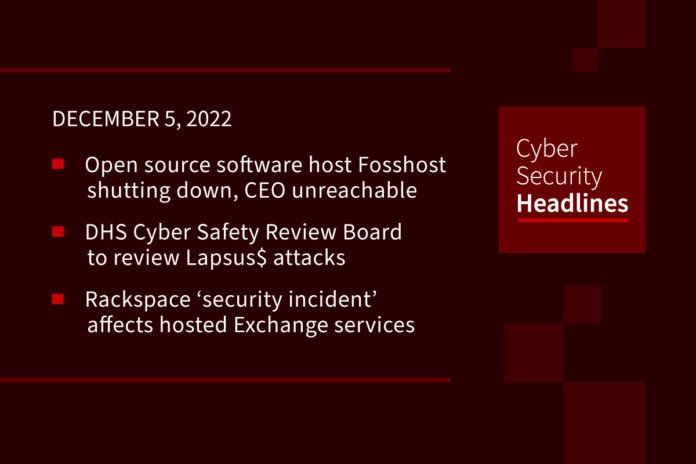Fosshost goes dark, DHS reviews Lapsus$, Rackspace security incident
Open source software host Fosshost shutting down, CEO unreachable
Fosshost project volunteers announced this development this past weekend following months of difficulties in reaching the leadership including the CEO. Users are being urged to immediately back up their data and migrate to alternative hosting platforms. As a UK-based non-profit, Fosshost has been providing services to several high profile open source projects like GNOME, Armbian, Debian and Free Software Foundation Europe (FSFE) completely free of charge. But as of this week various fosshost.org links are returning 404 error messages as the service closes.
DHS Cyber Safety Review Board to review Lapsus$ attacks
The Department of Homeland Security Cyber Safety Review Board has announced that it will review cyberattacks linked to the extortion gang Lapsus$, a global extortion-focused hacker group that has reportedly employed techniques to bypass a range of commonly-used security controls and has successfully infiltrated a number of companies across industries and geographic areas.” The review aims at developing a set of actionable recommendations for how organizations can improve their resilience to these types of attacks. The final report will be transmitted to President Biden through Secretary of Homeland Security Alejandro N. Mayorkas and CISA Director Jen Easterly.
Rackspace rocked by ‘security incident’ that has taken out hosted Exchange services
Some of Rackspace’s hosted Microsoft Exchange services have been taken down by what the company has described as a “security incident.” The incident has been described by the company as “isolated to a portion of our Hosted Exchange platform,” and no estimated time to restoration had been announced.
Researchers accidentally crash botnet used to launch DDoS and cryptomining campaigns
In November, security experts at Akamai described a Golang-based botnet that they had discovered, hijacking PCs via SSH and weak credentials in order to launch distributed denial-of-service (DDoS) attacks and mine cryptocurrency. The botnet, which the researchers…



